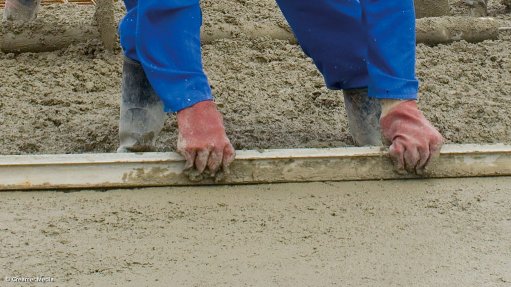
Photo by: Creamer Media
Despite a subdued trading environment, owing to intensifying competition in the ready-mix concrete segment, building materials company Sephaku Holdings has optimised its overall capacity utilisation in terms of production and transport, while further reducing its debt in the financial year ended March 31.
The group’s net profit decreased from R68.1-million in the prior financial year to R44.2-million, with headline earnings a share having decreased to 20.92c, compared with 33.37c in the prior year.
While the company is likely to remain under pressure for the next 12 to 18 months, CEO Lelau Mohuba on Thursday said the scenario is “much more positive on the cement front, with improved industry annual pricing per tonne of between 3% and 5% for the 12 months ended December 2017”.
Sephaku subsidiary Dangote Cement SA was successful in implementing an average increase of 5% a tonne, with the positive pricing trend having continued into the current calendar year.
The subsidiary achieved a 3.7% increase in revenue to R2.4-billion in its financial year, which ended December 31, 2017.
The R90-million increase in net profit in the second half of the year to R73.9-million was driven by increased sales volumes, higher pricing and improvements in operational efficiencies.
The quarterly earnings before interest, taxes, depreciation and amortisation (Ebitda) margins recorded for the second half were 23% in the third quarter and 25% in the fourth quarter.
The improvement in the latter six months significantly reduced the negative impact of the weak performance in the first six months, Mohuba said, which had been caused by excessive rainfall and low demand resulting in a loss of about R16.1-million for the interim period.
In the first quarter of the current financial year, the cement subsidiary increased its revenue by 13% to about R566-million. Quarterly sales volumes increased by 7% year-on-year mainly owing to the suppressed performance of the comparative period, Mohuba commented.
In terms of debt repayments, the subsidiary repaid about R474-million in the 2017 financial year, and is scheduled to further reduce its debt to R1.56-billion by December this year.
Meanwhile, Sephaku’s Metier Mixed Concrete subsidiary implemented a marginal price increase of 1.8% per cubic metre but recorded a 1.1% decrease in revenue to R830.7-million owing to a 3% decline in sales volumes in the financial year to March 31.
Its twelfth plant, which started production in March 2017, contributed about 7% to the sales volumes, with a commensurate increase in production costs of 8.5%.
Metier further commissioned a mobile plant in March this year, located in Centurion, to supplement the existing plant capacity in specific nodes with growing demand.
This, Sephaku CFO Neil Crafford-Lazarus said will allow the company to access new markets during a difficult time.
The increases in costs on lower volumes resulted in comparatively lower Ebitda and Ebit margins of 10.9% and 9.6% respectively.
Metier's net profit was R48-million against R67.4-million achieved in the previous year.